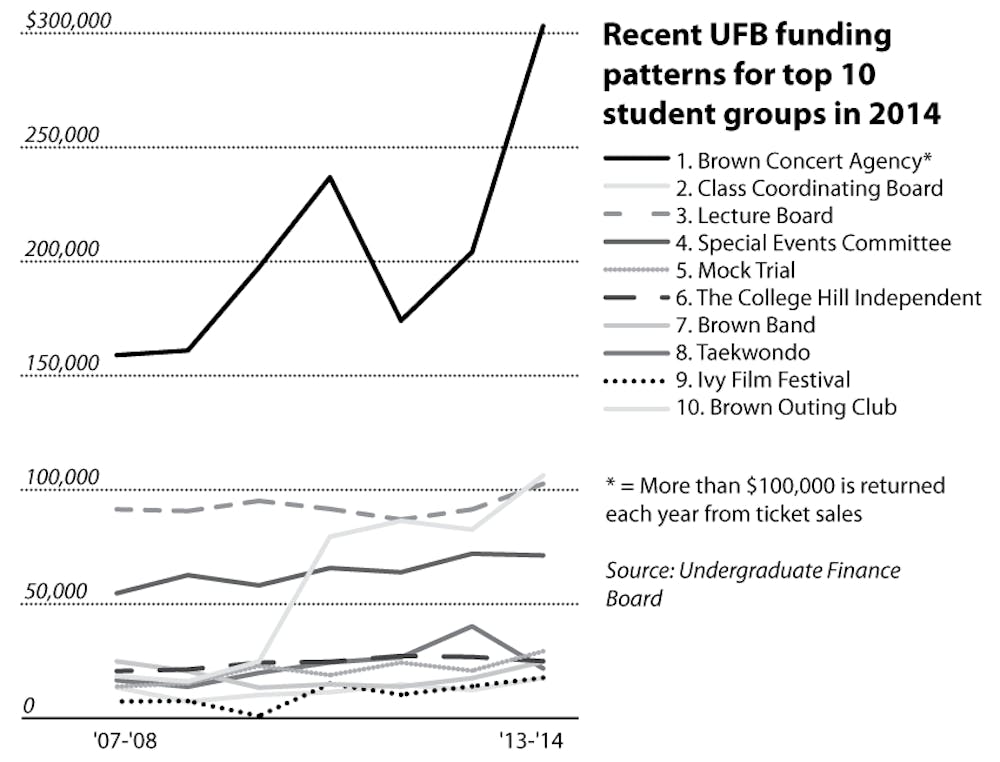The Undergraduate Finance Board has met 82 percent of student groups’ funding requests for the upcoming academic year, marking an increase from 70 percent this year.
UFB leadership provided The Herald with the numbers, which have not yet been publicly released.
The board allocated $1.15 million out of the $1.35 million that 149 groups collectively requested, said UFB Vice Chair and Chair-elect Alex Sherry ’15. Last year, the board doled out a more modest $1 million out of the $1.4 million total request, he said.
“It was our goal to at least fund to 80 percent, so we’re happy that we were able to reach that goal,” said UFB Chair Leila Veerasamy ’15.
UFB leaders were better able to meet student groups’ needs this year because they factored large, annual events into spring budgeting instead of supplemental budgeting, Sherry said. For example, UFB considered the costs of Brown International Organization’s World Cultural Dinner and the Students of Caribbean Ancestry’s Ebony Soiree in spring budgeting. As a result, these groups did not have to demand supplemental funds, he said.
The board also abandoned its practice of giving out loans for the first time this year, Sherry said. In past years, loan money that student groups didn’t end up using languished irretrievably. “Instead of tying up those cash reserves, we were able to use those for groups,” he said.
Last semester, the Undergraduate Council of Students voted to encourage the University Resources Committee to raise the student activities fee from $250 to $262, though the committee decided to keep it constant. UFB relies on the fee to fund its budget.
Of the 149 groups vying for funding this year, Brown Concert Agency led the pack, receiving approximately $303,000 — a roughly $100,000 year-to-year increase — followed by Class Coordinating Board with around $106,000 and Brown Lecture Board with about $102,000.
“There aren’t a lot of fluctuations in the top 30 groups — they stay mostly the same,” Veerasamy said. “The top five are usually groups that are known to throw huge events,” she added, citing BCA’s Spring Weekend and Class Coordinating Board’s Gala as examples.
“We were expecting to go down a bit, but they gave us a huge amount of money,” said Will Peterson ’14, BCA publicity chair.
The gap in funding between BCA and other groups is smaller than it appears, Sherry said. BCA uses revenue from ticket sales to cover the cost of holding the concerts and then returns any leftover revenue to UFB, he said, adding that BCA is set to give back around $100,000 this year.
As the 11th-highest funded group, Production Workshop saw a jump in funds from $11,400 this year to approximately $15,700 for next year.
“We’re super satisfied with how UFB allocated funding for us,” said Jenny Gorelick ’14, PW treasurer. “We got everything that we asked for.”
PW has requested a greater budget each year due to the rising costs of show rights and the need to replace deteriorating equipment, Gorelick said, noting that rights for popular shows such as last year’s “Company” can cost up to $700. Next year’s increased budget will go toward adding guard rails to the audience platform and replacing pipe connectors in the theatrical lighting grid, she added.
Several publications made it into the top 30 highest-funded groups, including the College Hill Independent with approximately $25,000 and VISIONS with roughly $13,000.
The Asian American Student Association vaulted into the top 30 highest-funded groups for the first time, almost doubling its funding from approximately $5,500 to around $10,000 due to the costs of hosting a large conference featuring international speakers, Sherry said.
Groups that were not included in the top 30 operate on smaller budgets but still had their needs met, Veerasamy said. “Just because groups aren’t in the top 30 doesn’t mean they’re not receiving a lot.”
Looking ahead, Sherry said he looks forward to serving as UFB chair during a year when many groups will be holding events and lectures to commemorate Brown’s 250th anniversary.
In his upcoming role, Sherry said he would work to keep delivering funding decisions to student group leaders in person and devoting significant efforts to supplemental budgeting. “There was a lot that was set in motion this year that we will continue to work on next year,” he said.
A previous version of this article incorrectly stated that the Undergraduate Council of Students voted last semester to raise the student activities fee from $250 to $262. In fact, UCS voted to recommend such an increase, but the University Resources Committee opted to keep it at $250. The Herald regrets the error.

ADVERTISEMENT




